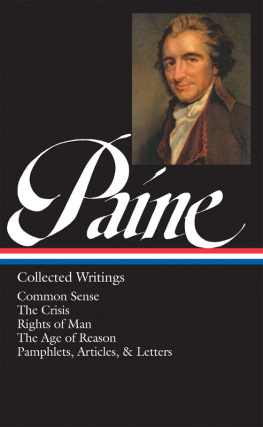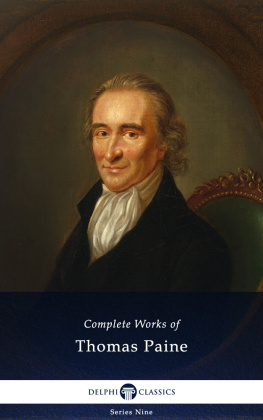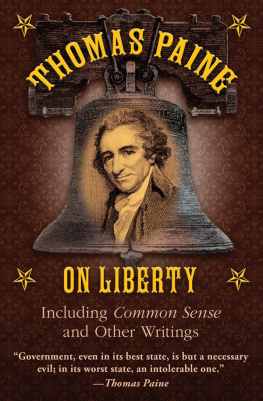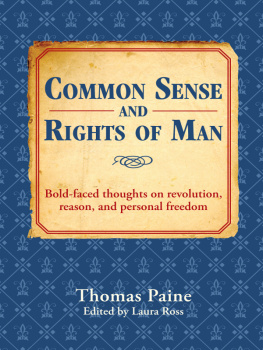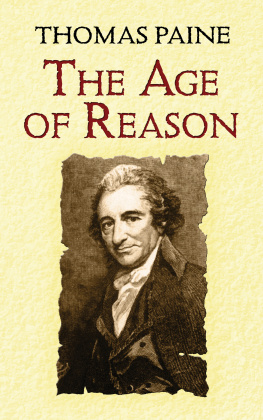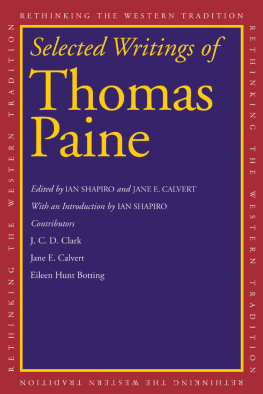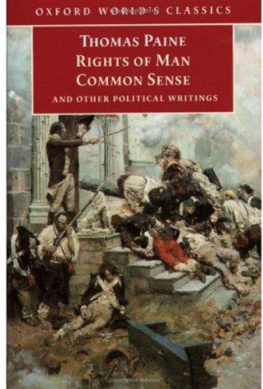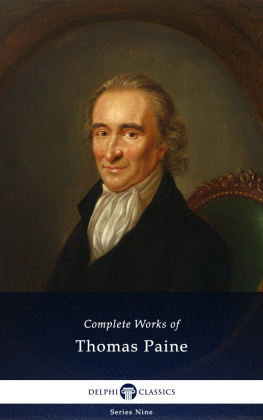AGE OF REASON
Thomas Paine
2014 Michigan LegalPublishing Ltd.
Grand Rapids, Michigan
Academic and bulk discountsavailable at
www.michlp.com
ISBN-13: 978-0615983820
ISBN-10: 0615983820

AGE OF REASON
Contents
INTRODUCTION
Adapted From
A LittleJourney to the Home of Thomas Paine
By Elbert Hubbard
ThomasPaine was an English mechanic, of Quaker origin, born in the year 1737. He wasthe author of four books that have influenced mankind profoundly. These booksare Common Sense, the Age of Reason, the Crisis, and the Rights of Man.
In 1774,when he was thirty-seven years old, he came to America bearing letters ofintroduction from Benjamin Franklin.
On arrivingat Philadelphia he soon found work as editor of The Pennsylvania Magazine. In1775, in the magazine just named, he openly advocated, and prophesied, a speedyseparation of the American colonies from England. He also threw a purple shadowover his popularity by declaring his abhorrence of slavery.
Hiswritings, from the first, commanded a profound attention, and on the advice andsuggestion of Dr. Benjamin Rush, an eminent citizen of Philadelphia, thescattered editorials and paragraphs on human rights, covering a year, weregathered, condensed, revised, and made into a book.
This pamphlet,or paper-bound book, was called Common Sense.
In France,John Adams was accused of writing Common Sense. He stoutly denied it, therebeing several allusions in it stronger than he cared to stand sponsor for.
In England,Franklin was accused of being the author, and he neither denied nor admitted it.But when a lady reproached him for having used the fine alliterative phrase,applied to the King, That Royal British Brute, he smiled and said blandly, Madame,I would never have been as disrespectful to the brute creation as that.
CommonSense struck the keynote of popular feeling, and the accusation of treason,hurled at it from many sources, only served to advertise it. It supplied thecommon people with reasons, and gave statesmen arguments. The Legislature ofPennsylvania voted Paine an honorarium of five hundred pounds, and theUniversity of Pennsylvania awarded him the degree of Master of Arts, inrecognition of eminent services to literature and human rights. John QuincyAdams said, Paines pamphlet, Common Sense, crystallized public opinion andwas the first factor in bringing about the Revolution.
Rev.Theodore Parker once said, Every living man in America in 1776, who couldread, read Common Sense, by Thomas Paine. If he were a Tory, he read it, atleast a little, just to find out for himself how atrocious it was; and if hewas a Whig, he read it all to find the reasons why he was one. This book wasthe arsenal to which colonists went for their mental weapons.
As CommonSense was published anonymously and without copyright, and was circulated atbare cost, Paine never received anything for the work, save the twenty-fivehundred dollars voted to him by the Legislature.
Whenindependence was declared, Paine enlisted as a private, but was soon madeaide-de-camp to General Nathanael Greene. He was an intrepid and effectivesoldier and took an active part in various battles.
InDecember, 1776, he published his second book, the Crisis, the first words ofwhich have gone into the electrotype of human speech, These are the times thattry mens souls. The intent of the letters which make up the Crisis was toinfuse courage into the sinking spirits of the soldiers. Washington ordered theletters to be read at the head of every regiment, and it was so done.
In 1781Paine was sent to France with Colonel John Laurens to negotiate a loan. Theerrand was successful, and Paine then made influential acquaintances, which werelater to be renewed. He organized the Bank of North America to raise money tofeed and clothe the army, and performed sundry and various services for thecolonies.
In 1791 hepublished his third book, the Rights of Man, with a complimentary preface byThomas Jefferson. The book had an immense circulation in America and England. Byway of left-handed recognition of the work, the author was indicted by theBritish Government for sedition. A day was set for the trial but as Painedid not appear those were hanging days and could not be found, he wasoutlawed and banished forever.
He became amember of the French Assembly, or Chamber of Deputies, and for voting againstthe death of the King, came under suspicion, and was imprisoned for one year, lackinga few weeks. His life was saved by James Monroe, Americas Minister to France,and for eighteen months he was a member of Monroes household.
In 1794while in France, there was published simultaneously in England, America, andFrance, Paines fourth book, the Age of Reason.
In 1802Thomas Jefferson, then President of the United States, offered Paine passage toAmerica on board the man-of-war Maryland, in order that he might be safe fromcapture by the English who had him under constant surveillance, and were intenton his arrest, regarding him as the chief instigator in the American Rebellion.Arriving in America, Paine was the guest for several months of the President atMonticello. His admirers in Baltimore, Washington, Philadelphia, and New York gavebanquets in his honor, and he was tendered grateful recognition on account ofhis services to humanity and his varied talents. He was presented by the Stateof New York in token of heroic work for the Union, a farm at New Rochelle,eighteen miles from New York, and here he lived in comparative ease, writing,and farming. He passed peacefully away, aged seventy-two, in 1809, and his bodywas buried on his farm, near the house where he lived, and a modest monumenterected marking the spot.
Nine yearsafter the death of Paine, William Cobbett, the eminent English reformer, stungby the obloquy visited upon the memory of Paine in America, had the graveopened and the bones of the man who wrote the first draft of our Declaration ofIndependence, were removed to England, and buried near the spot where he wasborn. Death having silenced both the tongue and pen of the Thetford weaver, noviolent interference was offered by the British Government. So now the dead manslept where the presence of the living one was barred and forbidden. A modestmonument marks the spot. Beneath the name are these words, The world is mycountry, mankind are my friends, to do good is my religion.
In 1839 amonument was erected at New Rochelle, N.Y., on the site of the empty grave wherethe body of Paine was first buried, by the lovers and admirers of the man. Andwhile only one land claims his birthplace, three countries dispute for theprivilege of honoring his dust, for in France there is now a strong movementdemanding that the remains of Thomas Paine be removed from England to France,and be placed in the Pantheon, that resting place of so many of the illustriousdead who gave their lives to the cause of Freedom, close by the graves ofVoltaire, Rousseau, and Victor Hugo. And, the reason the bones were not removedto Paris, was because only an empty coffin rests in the grave at Thetford, asat New Rochelle. Rumor says that Paines skull is in a London museum, but ifso, the head that produced the Age of Reason cannot be identified. And theend is not yet.
The geniusof Paine was a flower that blossomed slowly. But life is a sequence and the manwho does great work has been in training for it. There is nothing like keepingin condition, one does not know when he is going to be called upon. Preparedpeople do not have to hunt for a position the position hunts for them. Paineknew no more about what he was getting ready for than did Benjamin Franklin,when at twenty he studied French, evenings, and dived deep into history.
Next page

